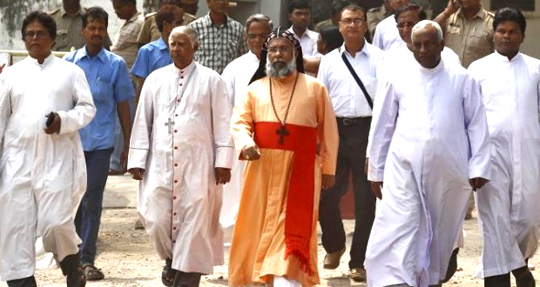Bengaluru, Mar 2: Emphasising that India was a pluralistic country, president of the Catholic Bishops' Conference of India (CBCI) and Archbishop of Trivananthapuram, Baselios Cleemis Cardinal Thottunkal, on Tuesday asserted that the majority of Hindus in the country were secular.

“Politics is certainly good, but not vote-bank politics. If the entire Hindu community in India had decided to be communal, the Christians, Muslims and Sikhs would not have been safe. Thanks be to God… the majority of Hindus in India are secular. The virtue of secularism should be celebrated by all,” Cardinal Thottunkal told reporters here on the sidelines of a press conference.
The head of the CBCI said attacks on the minority communities in India had come down, but it was derogatory statements that were creating trouble.
“There is a dignified space for everyone in India to believe, profess and propagate their faith. But when the secular fabric of the country is under attack, we all should stay together as a nation and face it,” he stressed.
He pointed out that the Christians, despite being a minuscule community, had been providing the best healthcare services in the country after the Government of India.
32nd CBCI plenary
The Cardinal said a week-long plenary assembly of the Catholic Bishops in India, which will be held in the City from March 2, would discuss various issues related to the Church and India. “As many as 180 bishops from all the dioceses in India will deliberate on the theme, “The Response of the Church in India to the Present Day Challenges,” he told reporters. Several experts and resource persons in the religious, socio-political and economic fields, including scholars from the Hindu and Muslim communities, will address the bishops. “The plenary will discuss secularism as well as interreligious dialogue,” he said.





Comments
In every religion, the majority are indeed broad and secular.
The trouble comes from disproportionate and negligible part of the society.
If every religious group identify and punish their own men who are troublesome, then no fear for others.
But unfortunately the majority of innocent people keep quiet and do not raise concern, don't condemn and don't punish their men. This is the problem.
Let us start doing justice to the victims without waiting for their request or before they seek justice.
we have to show will, we can succeed with peace and justice in the community
What Mr. Cardinal Thottunkal said is 100% right. Hindu, Muslim, Christians are brothers and are not enemies. Majority of Hindus are secular. Communal elements like RSS is a minority. Even they came to power with just 31% of vote. Now, fabric of our country is under threat! we all should stay together and defeat the communal forces.
Christians mostly targeted in India by Hindus, This statement of Bishops may give some relief and security to them this is nothing but getting confidence and muskafying to live safely otherwise there is no truth in bishops statement.
Add new comment